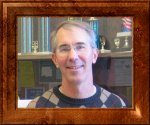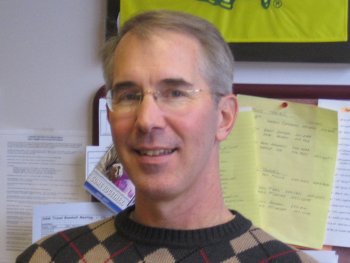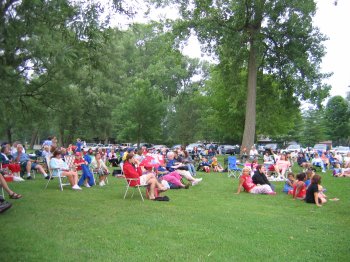- By Dan Veaner
- Around Town
 Print
Print  Steve ColtAnyone who has children in Lansing knows about the Parks and Recreation Department. And chances are you have talked to Park Superintendent and Recreation Director Stephen Colt. Steve has presided over an enormously successful recreation program for about 20 years, giving Lansing a lot more bang for its buck than you would imagine in a small rural community, and providing programs and facilities in the parks that are popular and well used.
Steve ColtAnyone who has children in Lansing knows about the Parks and Recreation Department. And chances are you have talked to Park Superintendent and Recreation Director Stephen Colt. Steve has presided over an enormously successful recreation program for about 20 years, giving Lansing a lot more bang for its buck than you would imagine in a small rural community, and providing programs and facilities in the parks that are popular and well used.A lifelong Lansing resident, Colt and his wife Ann have one son, Thomas, who will begin student teaching history in the Groton schools this Spring. Surprisingly for the sheer scope of the programs the department offers, he only has two full time employees, Patrick Tyrrell , Maureen Muggeo. But with his engaging style and relentless hard work he has managed to enlist hundreds of volunteers and to attract top notch instructors and coaches for programs that range from soccer, skiing, and basketball, to art, drama and karate.
The Lansing Star caught up with Colt in his office this week to talk about his life, the recreation program, and the parks. In this week's installment of a three part exclusive interview, Colt talked about what brought him to 'Parks and Rec'. Next week he talks about the recreation program, and after New Year the series wraps up with his take on Lansing's parks.
Lansing Star: Did you grow up here?
Steve Colt: I grew up in Lansing, born in 1955, and went to Lansing Elementary and the middle and high school were in the same building then, which is now the middle school.
My graduating class of 1974 was the last class out of that building. The very next year it went to the new one.
LS: What sports did you play?
SC: Pretty much everything, basketball, baseball, football, skied... you name it, I did it. I played on varsity, level nine varsity letters. We had a good time playing.
LS: Were classes smaller?
SC: Yes, our class was smaller. I think my class was mid to upper 70s, it wasn't very large our senior class.
LS: It is approaching some of the current class sizes.
SC: Yeah, we are kind of going all the way around. It's coming back to that again a bit. Obviously there have been some spikes over the recent years of mid 120s. That's the high.
Ours is considered maybe middle of the road over the course of Lansing schools.
LS: Where was Ann from?
SC: Ann was from up near the Rochester area. We met in college, Cortland State. We got out in 1979. My degree was in physical education teaching, and hers was a combination business and education degree. She was actually a middle school science teacher for a while. She went back and got her masters and got her degree to be a principal. She ended up going to work for the United Way and now she is the director for community relations campaign for United Way Tompkins County.
LS: Where did you work coming out of college?
SC: Coming out of college I looked for some teaching jobs. In the mid 70s it was tight so I wanted to get started doing something. I took a job in the athletic equipment sporting goods field.
It was my personal interest. I still believe it's nice if the job you choose is something you're really passionate about. It was sort of a meager start but I worked for Robert Cullen and Associates out of Ithaca. It was a family owned but high quality sporting goods, both retail and team and wholesale which I worked in that department.
That was very interesting for me because I got to do a lot of traveling and met with high school and college athletic directors and coaches. It was very interesting.
From there, I started this (working with Lansing Recreation) on a part-time basis from home.
LS: So the department existed then?
SC: There was a recreation department even back when I was a kid. There was a community member who actually ran it. I think there was some swimming lessons and baseball, a few of the basic things. The gentleman's name was Mr. Robinson and he ran it, I think, as a part-time job for himself as well.
LS: Was that a volunteer position?
SC: I'm not sure, I think he was paid a stipend to do it. And actually during college my summers in college, I used to work for the rec department and was a swim instructor, taught golf here on what's now the baseball fields, and coached some of the Babe Ruth teams that were here.
Then -- turn around -- years later coming back in getting involved with the department, I started out on a part-time basis. When I was working both the job at Cullen's and here, I was working part-time basically out of the basement of the old town hall which is now the library, a little cubbyhole arrangement, which was fine because most of the things I had to do I did it at night from my home.
We started to grow. We took more things on and got more people involved in it and it got to the point there just wasn't enough hours in the day to physically do both jobs.
I was really looking for a change. This was really more in the area I had been really trained for.

Steve Colt
LS: Were you getting paid at the time?
SC: Yeah, but it was a stipend type of thing. So I made the decision to basically come to the town. At the same time, lucky for me, the town was really interested in coming to the next level with this.
So the timing really fell into place for this to happen.
LS: About when was this?
SC: I'm going to say early in 1987. The town made the commitment so we got after it more on a full-time basis for recreation. Not many months after that. This was back when Bud Howell was Supervisor at that point, but Jeannie Kirby took over and it was really under Jeannie's leadership that it went to a full-time position. Also down the road, the responsibility for the parks department was incorporated and put together as parks and recreation. That seemed very logical and has worked well to this day.
LS: Was that something she came up with or you came up with?
SC: Well, they approached me on the parks part of it, and consolidated to make it worthwhile. Not many towns our size can afford or justify having just a recreation person.
But by the time you put both together and you push it out to where we currently have it, it is more than enough to take a year on with help. We're very glad for that.
LS: We have four parks today, but did we have that many at that time?
SC: Well, the parks at that time were here but they were quite rough. Myers Park was relatively active but without a lot of direction and much of a plan in progress. The ball fields at that point were just the upper field -- basically four to six fields on top with nothing else around.
The restrooms weren't here, the pavilion wasn't here, the lower fields, the parking, none of that was here. The back fields behind the town hall were not here either. That was all developed as needed and as we felt appropriate from that day to this.
LS: Did you envision at that point it would become so big?
SC: I really didn't. All we wanted to do was to try and do a quality job and get the public involved. Facilitate different ideas and programs that we had and the parents had and the adults had that they wanted to see run.
You mention recreation being the job here but a lot of times I think of it as being a facilitator because to do all of the things that we do, we could just never do without our community buying in like they did. Getting on board and helping with countless hours of volunteering to make this stuff happen.

Crowds gather each summer for concerts in Myers Park
LS: Well, that does seem right to me. Whenever I come in here you are always on the phone and you're talking to some coach somewhere or somebody that is running a similar program or putting a league together, putting a tournament together.
SC: Yeah, it's about finding out what the people want to do, what the kids are interested in, things that we want to do with them, then try to find the supporting cast which is most cases is our very willing community that steps up.
The next stage is that they feel comfortable with whatever they are going to be doing. If that involves clinics or training that we provide or just to sit down and meet with them to give them a basic comfort factor in what they are going to embark on which is going to coach a team or work with kids or to teach different things that they want taught or the way we want taught, then that is really the key.
The participants are there. The main thing is to network with people and make sure you have the logistical things done and the structure to the program you want done. Do that first, then send it out to the public for participants and they have, thank goodness, always been there for us. They are always interested and are willing to try the different things we have tried.
LS: When you were young in the job, did you have kind of a master plan you wanted to try out?
SC: Not really, other than seeing other communities that were always a lot bigger than we were and saying, 'Hey, we can scale that down and try that hear and it works.'
My background in physical education helps with the actual functional part of running a program, but you soon found out that if you are actually tied up in running the program, you can only run one at a time. If you orchestrate and facilitate other people to do what you want done you can run 20 programs at a time.
The sales part helped in that I had a huge background in athletic facilities and equipment. I also was able to network with an awful lot of people that I met over the 15 to 17 years in that job that did this in other communities, or did it at the college level, so it was very easy for me to make a phone call or two and reach out to them and say hey, here's something we want to try, can we do it?
LS: So you were working in sales for some time.
SC: Oh, yeah, I went to Cullen's, I graduated from Cortland State in 1979 and went right directly into the sporting goods business and was there basically until I sort of transferred over to this.
There was a point at which both were being done at the same time, and obviously transferred from that into this and started in here.
LS: Were you living in Lansing at the time?
SC: I was.
LS: Are you still?
SC: Yes, still living in Lansing. Got married in 1980 and we moved into apartments that were local here in town and had a home built and that's where we are still to this day.
We are pretty well grounded here.
In next week's installment we ask Colt about the Town recreation programs.
----
v2i48



